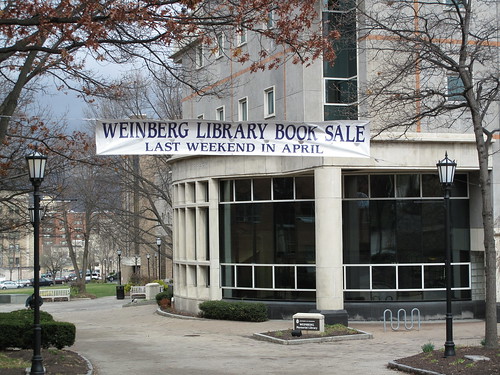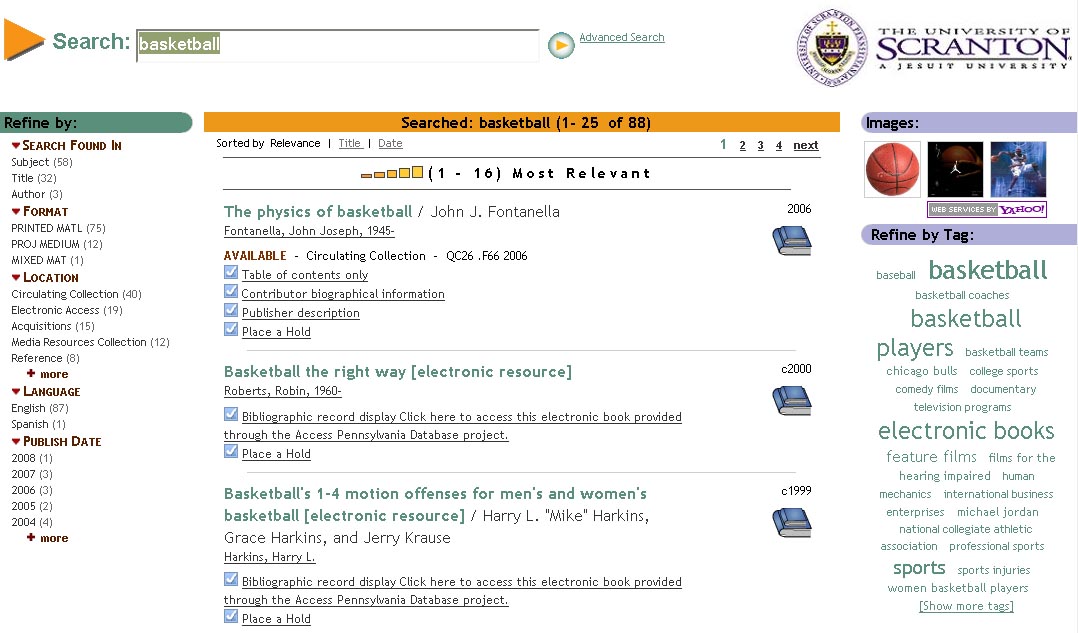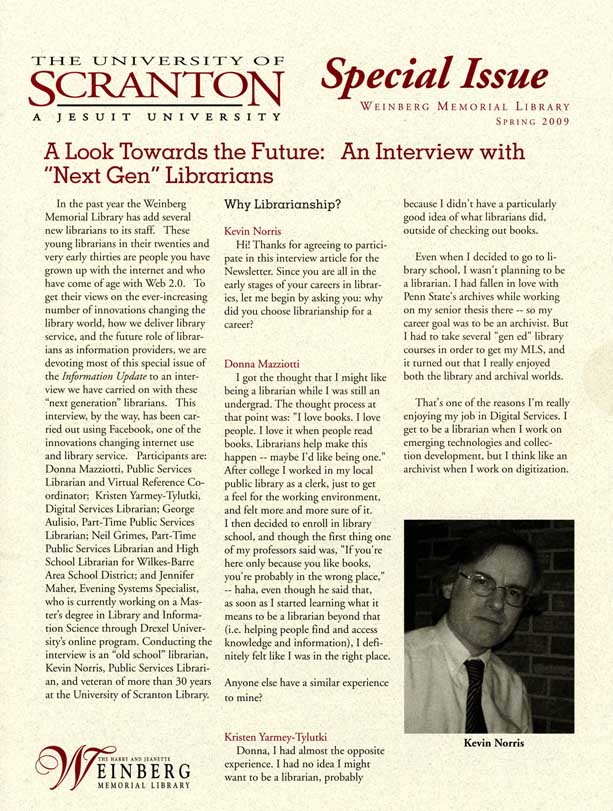Only 18 more days until the 2009 Weinberg Memorial Library Book & Plant Sale!
More study space, starting Monday!
Our students have been asking for more study space (such dedicated learners!), and here at the Weinberg, we’re doing our best to meet their needs.

During intersession, Library staff members moved some of our less-often used print periodicals down to the basement in order to free up some space on the 1st floor. The shelves that used to hold those periodicals have just been removed, so there’s a nice chunk of empty space waiting by the group study rooms.
Tables and chairs have been ordered and will arrive on Monday. Be the first to try them out, and let us know what you think!
Update: The freight company who is shipping our new furniture had to change our delivery date from today (Monday) to tomorrow (Tuesday). So we’ll have to wait one more day for our new study space. Sigh.
Update Part 2: New tables and chairs are here! Come try them out!
Reference Books
Reference Books. How do I love thee? Let me count the ways…

One, you are intelligent.
Two, you are a good conversationalist–you always have something interesting to say.
Three, you are trustworthy–I always feel safe repeating what you tell me.
Four, you would never cheat on me–you are always right where I left you and would never be caught out of the library.
Alas, we have not always been so good to you…
The large majority of us disregard you and forget to visit you from time to time.
Many of the ones who do like to spend time with you will often not give credit to the smart things you say.
Lastly, we are seeing other reference books on the side…
Three Cheers for our new Catalog!
The University of Scranton Weinberg Memorial Library is proud to present…
Our new catalog!!
Okay, technically it’s not really a new catalog – our Library catalog still includes all of the books, e-books, videos, and periodicals you know and love. But it does have a shiny new interface that we hope will make it easier for our students and faculty to discover new resources.
New features of the catalog include…
- A Tag Cloud that you can use to find resources on similar topics (you can even add your own tags if you like!)
- A “Refine By…” tool to help you narrow down your search results to exactly what you need for your research
- An “Articles and More” tool that will help you extend your search to find articles from some of our databases
- A “Recently Added” box to show you what’s new on any given topic
Interested? Try out a search by going to the Library’s homepage. Type in the box, and hit the big orange arrow.
Don’t like what you see? You can still use the “classic” catalog interface – just look under the Library Catalogs menu and click on the first link for Our Classic Catalog.
Pro Deo Room Computers
Thanks to the students and faculty who have gave us feedback in the LibQual Survey. During Spring break, the Information Resources staff and Library Systems staff worked to improve computer performance in the Pro Deo Room. Staff worked on each computer work station and upgraded the network hubs on the 1st and 3rd floors to switches in order to improve network performance on those floors. We welcome your input. Please report any computer problems to the Circulation Desk on the Library’s 1st Floor.
Thank You.
Joining the Twitterverse
Ellen DeGeneres, The Daily Show, and 110 members of Congress all Twitter – so why not us?
From now on, get the latest Weinberg Memorial Library news (and an RSS feed of our blog posts) by following us – @UofSLibrary. While you’re at it, reply and let us know what you think of our Library! In 140 characters or less, that is.
If you’re like us and new to the Twitterverse, here are a few resources to help you get started on your new so-microblogged life:
- Feeling tweepish about not knowing what the heck your tweeple are tweeting about? You need the Twitter Glossary from the Twitter Fan Wiki.
- With Twitter Search, you can watch what the world is doing in real time.
- Nearby Tweets helps you find other tweeple in your city.
- Tweet Deck is an application that can help you manage your incoming tweets.
- Last but not least, if you’re presenting to a group of techno-savvy people anytime in the future, check out speaking expert Olivia Mitchell’s recommendations for “How to Present While People are Twittering.”
Need help figuring out who to start following? Here are some of our favorite Scranton tweeters – it is #followfriday, after all!
- @univofscranton
- @ScrantonAquinas
- @ScrantonAlumni The University’s Alumni Office
- @scrantonsbdc The University of Scranton’s Small Business Development Center
- @timestribune Local news from the Scranton Times-Tribune
- @ScrantonLibrary The Scranton Public Library
We’ve also noticed a mysterious new Twitter account, @scottpilarz. Could it be our very own University president?
Update: On our Research Guides wiki you can now find an introduction to Twitter, as well as a continually updated list of University of Scranton Twitter accounts and our favorite NEPA Tweeps.
Spring Break Hours, and Internet Outage
Midterms are almost over (cue victory music), and that means Spring Break is upon us. Here are the Library Hours over the next week for Spring Break:
Friday, March 13: 8:00 AM-4:30 PM
Saturday-Sunday, March 14-15: Closed
Monday-Thursday, March 16-19: 8:00 AM-10:00 PM
Friday, March 20: 8:00 AM-4:30 PM
Saturday, March 21: Closed
And on Sunday, March 22nd, we return to our normal schedule.
One other important update regarding access to the Internet on-campus over Spring Break:
Please note, there will be an extended Internet and Wireless Network outage on Monday, March 16th from 5:00pm to 9:00pm and again on Tuesday, March 17th from 5:00pm to 9:00pm in order to accommodate necessary network security maintenance and upgrade procedures. During these periods, all internal resources (e.g., my.scranton, Banner, Angel, Self-Service) will still be available from on-campus locations, however there will be no Internet or Wireless network connectivity.
So, there ya have it. Have a great break everyone! Be safe!
Born Digital
What does it mean to be born digital? Maybe it is a question you never considered before. To be born digital means to be a part of the “digital haves” and to have the ability to actively engage in technology that will continue to shape the very future of human civilization. Those of you who are reading this blog are a part of the “Digital Generation,” the generation whose lives were profoundly shaped by technology and continue to be shaped by technology. Whether we realize it or not, the very world in which we live is being shaped by “Digital Natives,” people born after 1980 who grew up using technology and who have shaped the direction and impact that technology plays in our everyday lives. I, myself, am a “digital native” and find it difficult to imagine a world without technology in it and feel that technology affects nearly every aspect of my daily life.
Not everyone in this world is born or becomes a “digital native.” There still exists a digital divide between the digital-haves and the digital have-nots. Only around 1 billion out of the 6 billion people in the world have access to digital technologies (Palfrey & Gassner, 2008). It is this group of people (“Digital Natives”) that is shaping our day-to-day lives and is determining how civilization will advance as a whole. Advancements in technology have led to the creation of new knowledge. It is amazing how technology in its various forms has improved all of our lives in some way over the years.
Are our lives shaped daily by technology, the “digitization” factor? Can you think back to a time in your life where technology played a less prominent role than it does today? Would you refer to those moments of your life as the “dark ages?” Certainly, a “digital native” would not be able to recall many moments where their lives weren’t shaped by technology.
The use of technology continues to shape our lives, yet there are many issues that arise from the use of it. Among the issues are: security, privacy, identity, piracy, and information overload. As we progress in the 21st century, it is important to consider the role that technology will play in our lives. Will we be overly reliant on it or be more moderate in our use of it? Only time will tell how my generation and prior ones will continue to be impacted by technology.
Note: This post was generated as a result of a recent book that I had read titled Born Digital – Understanding the First Generation of Digital Natives by John Palfrey and Urs Gasser which was recently published in 2008. It brings up many important issues that those who were born digital and those who use technology will continue to face throughout the course of their lives. Also important to note, this book is a part of the Weinberg Memorial Library’s book collection (see link above for its record in the catalog).
Free Prints
You asked, we listened…
To: Students
From: Bonnie Strohl, Library Associate Director
Re: 200 Additional Prints for the Library UniPrint Stations
Date: February 27, 2009
Each year the Library has allocated 200 free prints to students for printing from the Internet on the Library’s UniPrint workstations located in the Fist floor Pro Deo Room and on the second floor. Last year student government asked for an increase of 50 prints bringing the annual total to 250 a year. We have learned that the way in which these prints were made available to students created the impression that students would receive 200 prints a semester.
To meet students’ expectations that they will have 200 prints a semester, the Library will add 200 prints to students’ cards this semester. From this point forward, all students will receive 200 prints in the fall and 200 prints in the spring each year (a total 0f 400 an academic year). Unused prints do not roll over. In the interest of sustainability, we encourage students to be conservative in their use of their prints.
We thank the students who came forward to bring this to our attention. If you have any questions or concerns, please contact me at strohlb1@scranton.edu
The additional prints will be applied to students’ cards by the end of the day Wednesday March 4th.
There ya have it! This has been a thorny situation for the past few weeks, and we are grateful to the students who spoke up about this. Kudos to our Library administration, faculty and staff for researching this issue at other institutions and coming up with a solution that works for us all.
Spring 2009 Newsletter
The Spring 2009 issue of the Weinberg Memorial Library newsletter has arrived! You can pick up the a paper copy of the Information Update at the Weinberg, or read the online edition.
This semester’s issue, edited by public services librarian Kevin Norris, features an interview with five of the Weinberg’s “NextGen” librarians, in which we discuss our careers, librarian stereotypes (including “guybrarians”), recent library innovations, and the library of 2050. Let us know what you think!





